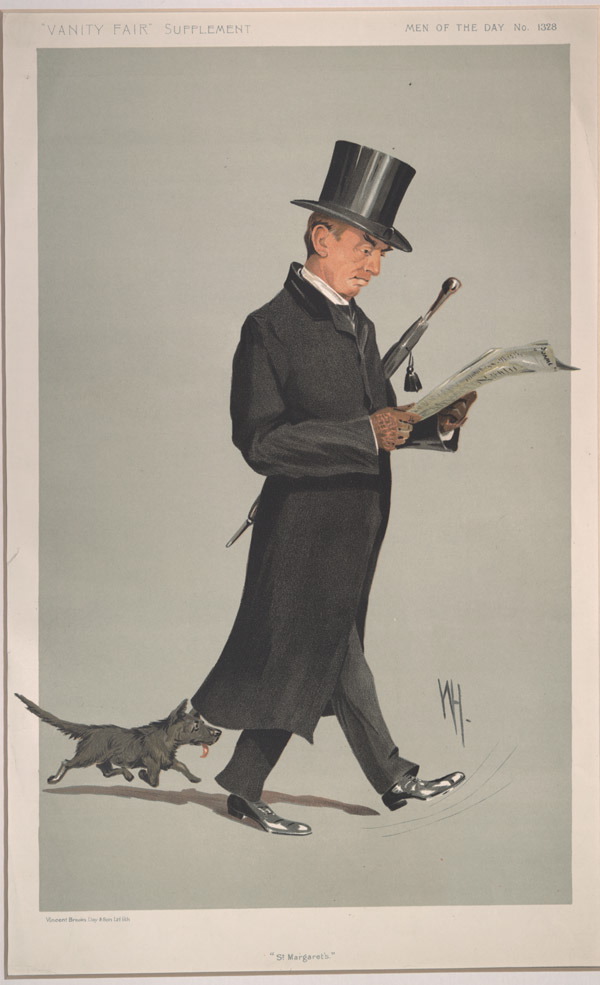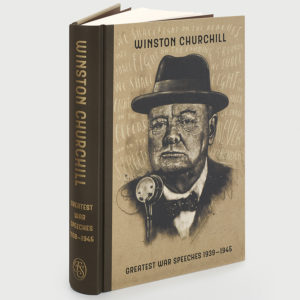
Finest Hour 191
“A Good Deal of Politics and No Christianity”

The Rt. Rev. Herbert Hensley Henson
January 1, 1970
Finest Hour 191, First Quarter 2021
Page 17
By Julia Stapleton
Julia Stapleton is Reader in Politics at Durham University
Winston Churchill would have met many leading Churchmen during the course of his career, often at public dinners. This is clear in a letter from Arthur Winnington-Ingram, Bishop of London, early in the war, requesting permission to dedicate a book to him, and reminding him of the acquaintance they had made on such occasions.1 Yet scarcely any could have struck him so favourably as Herbert Hensley Henson (1863–1947), Bishop of Durham from 1920 until 1939. Henson was an astute political observer, an early critic of Nazi Germany, and—rare among bishops of his generation—a vociferous opponent of socialism. He paid lavish tribute to Churchill after the war in the dedication of the third volume of his autobiography:
To Rt. Hon. WINSTON CHURCHILL O.M., M.P., &c. Statesman, Historian, Orator, the valiant and untiring champion of personal liberty and modern democracy, in recent years threatened both by external power and by ‘class-conscious’ political theories, the one man who has come through the Great Tribulation of the Second World War with a clear title to be hailed, as the Ancients hailed those citizens, who by their personal exertions and character saved the State, as Pater Patriae.2

2025 International Churchill Conference
This is a striking statement, from one of the most prolific and penetrating English writers of the early twentieth century, its “all-too-kind terms” accepted by Churchill as “a great honour.”3 Yet it has hardly ever been noted. Henson’s relations with, and opinions of Churchill deserve attention, not least as revealed in his extensive journals, a rich source on public life and the leading figures of his day that are now being brought into publication.4
Henson’s Early Impressions of Churchill
Henson had not always been an admirer of Churchill. During the first few weeks of the First World War, he wrote disapprovingly in his journal of Churchill’s apparent willingness to tempt providence. As First Lord of the Admiralty, Churchill had welcomed the prospect of “a decision at sea,” taunting the German fleet that if its ships did not emerge from port, they would be “dug out like rats in a hole.” Shortly afterwards, Henson recorded grimly the sinking of three British cruisers in the North Sea by German submarines.5
Henson and Churchill were sometimes considered to be similar public figures, in their eloquence, their independence of mind, their willingness to suffer isolation for their beliefs, and their appearance of inconsistency. Where Churchill changed political parties, Henson changed his stance on Church issues.
Nevertheless, despite these obvious similarities, Henson disliked the parallels that were drawn between himself and Churchill. When he had argued publicly in 1917 that the clergy should no longer enjoy exemption from compulsory military service, an anonymous correspondent denounced him as a “kind of clerical Winston Churchill.”6 His arch-enemy, the Anglo-Catholic Bishop of Truro, Walter Frere, described him in 1929 as “the Winston Churchill of the Church” after his recent embrace of disestablishment, a course that Henson had resisted fiercely throughout his earlier career. Henson dwelt privately upon the insult implied in such comparisons, and those made between him and other figures whose “brilliance” was allegedly divorced from “character,” for example, Lloyd George, F. E. Smith, and Pope Pius XI. He wrote, “[t]he suggestion always is that I am unstable, unscrupulous, ambitious, and insincere.”7
Henson’s volte-face on disestablishment had been triggered by Parliament’s rejection of the Church of England’s revision of The Book of Common Prayer on the two occasions in 1927–28. Since the Enabling Act of 1919, he had recognised the inconsistent position of the Church as a “national” church, while enjoying a large measure of autonomy through its newly created Church Assembly. With the assertion of parliamentary control over matters of doctrine in the late 1920s, Henson sought a future for the Church that would end its anomalous status. He had followed closely the debates in the House of Commons on the prayer book, and in his journal quoted admiringly Churchill’s intervention in the second debate in June 1928. While not enthusiastic about the revised book, Churchill identified disestablishment as the least worst solution to the chaos that would ensue from a further rejection. In the event of another defeat, he thought that the Church would lose its authority, fatally undermining the structure and unity of English life and the spirit of mutual forbearance that provided the key to the continuity of English history.8
An Evening at Grillion’s
Churchill’s Whig sensibilities concerning the uniqueness of English liberty and nationhood and the institutions that sustained them resonated strongly with Henson, and he made a clear impression on Churchill in these matters. The occasion was an animated discussion between them in May 1937 at Grillion’s, an elite dining club to which Henson had been elected unanimously twelve years earlier, and where he had encountered Churchill on at least one previous occasion, describing him as “bubbling over with fun and wit.”9 The subject of debate was the former King Edward VIII’s intention of marrying Mrs. Wallis Simpson. The Earl of Crawford and Balcarres gave a revealing account of the exchanges in his journal, as did Henson himself. It is evident that this was a very rare occasion when Churchill was not only out-argued but reduced to near-silence.
As a prominent “King’s friend” throughout the Abdication crisis in December 1936, and as a member of the Civil List committee, Churchill had defended the Duke of Windsor’s eligibility for financial assistance. This was before it became clear that the Duke had misled his brother, George VI, on the extent of his savings.10 With much of the assembled company hostile to the Duke, Churchill admitted that in view of his ample private means, it would have been wrong to apply pressure on Parliament to agree an annuity. He maintained, however, that, had the Duke’s means been limited, he and Lloyd George—a fellow member of the committee—would have fought “violently” for the Duke’s inclusion in the List. At this point, Henson cautioned Churchill against public discussion of the Duke’s financial affairs, lest his “scandalous” conduct over the previous eighteen months again become the focus of attention. Undeterred, Churchill persisted in his defence of the Duke, claiming that he could now marry Mrs. Simpson following the decree absolute of her second marriage to Ernest Simpson, which had been issued two days’ earlier.
Henson described Churchill’s understanding of the law and morality of divorce as “more confident than accurate.”11 He proceeded—in Crawford’s words—to “upset Churchill, rolled him over and over and left our argumentative friend without a plausible argument in his armoury.” Drawing upon a wealth of biblical, patristic, and historical evidence—for example, the Royal Marriages Act, 1772—he forced Churchill to accept that, in the eyes of the Church, Mrs. Simpson’s marriage to the Duke would be regarded as “doubly bigamous.”12 This was because the Church did not recognise the divorce from her first husband, grounded as it was in “incompatibility of temper.”13 Defeated, Churchill was left wondering “why…we [were] not told this before?” The same question crossed Crawford’s mind during the course of the discussion, speculating on “the consequences for history were this view made public.”14
For his part, Henson was magnanimous, describing Churchill as
a very good-tempered disputant,…[who] doesn’t mind owning himself beaten. I propounded my favourite rule, viz: that the essential bases of morality were fidelity to those cardinal duties into which we are born, & for the contracting of which we can have no personal responsibility viz: duty to God, to Country, & to Home. All other duties derive more or less directly from our own choice. Winston seemed impressed by this, & accepted it.15
Once Henson had departed, Churchill—whisky in hand—remarked that
he had been greatly struck by the foundation of history upon which the Bishop had throughout based his opinions—how different…from our ordinary political disputes where we lack this solid stratum of fact and expertise.16
Foreign Policy and the Dictators
It was on matters of foreign policy that the positions of the two men were to become closest. Henson had been an outspoken critic of Germany throughout the latter half of the 1930s, particularly its persecution of the Jews and of dissidents within the Christian Church such as Martin Niemöller. One outlet for his public criticism of Nazi Germany was the correspondence columns of The Times. There, for example, he condemned attempts to foster greater understanding between Britain and Germany, often led by Germany itself, as had occurred during celebrations to mark the 550th anniversary of the University of Heidelberg in 1936.17 In the same columns, he had shown equal disdain for Mussolini, condemning not just his invasion of Abyssinia but also the morally questionable response of the British Government in recognising Italy’s acquisition of the territory in the Anglo-Italian agreement of 1938.18 At the Grillion’s dinner a year earlier, he wrote that he was “interested, and perhaps surprized, to hear Winston speak very strongly about our treatment of Abyssinia”; with clear reference to the Hoare-Laval pact, Churchill had maintained that Baldwin should not have expressed his support for the League’s policy of sanctions had he not intended to follow it through.19Apart from a sermon delivered locally in Durham, Henson hesitated to condemn the Munich agreement, despite his suspicion that the western democracies had paid a heavy moral price for “peace.”20 Close to retirement, he did not attend the House of Lords on 4 October 1938 when the chamber debated the agreement that the prime minister had brought back from Germany. Privately, however, he recognised that the Government’s critics—Churchill, Eden, and Duff Cooper, Churchill especially—were correct in their analysis of the ill-fated agreement. In his journal, he praised Churchill’s speech in the House of Commons on 5 October: “Winston Churchill delivered himself of a whole-hearted denunciation of the Munich agreement, drew an alarmist picture of the European situation which it has created, and prophesied the worst possible future.” He continued: “I wish I did not find myself compelled to acknowledge the justice of his indictment, and the probability of his forecast.”21 On 17 October he wrote enthusiastically of Churchill’s broadcast to the United States following Hitler’s “insolent” speech at Saarbruecken threatening immediate war with Britain if either Churchill, Eden, or Duff Cooper became prime minister: “It is an admirable piece of vigorous political invective: and, if anything could move that low-toned multitude of dollar-slaves, ought to set them thinking.”22
Henson nevertheless urged friends not to speak disrespectfully of Chamberlain, given the qualities he had brought to public life across a long career.23 He continued to hold Chamberlain in high regard, even when he was forced to resign in May 1940; despite what he termed “the crowning blunder of Munich, in which the interest and honour of Great Britain were deeply injured,” he regretted that Chamberlain had left office under a cloud. Even so, he was relieved that Churchill was now prime minister, having “earned” the premiership through being “consistently right in his opinion of Germany,” and after winning the confidence of both the Navy (as First Lord of the Admiralty again) and the Nation.24
Churchill’s First Ecclesiastical Appointment
Henson was not disappointed in the faith he placed in Churchill’s leadership; but Churchill also had faith in Henson. In August 1940, in his first ecclesiastical appointment, Churchill nominated Henson to the King for a vacant canonry in Westminster Abbey. During a meeting with Henson in the Athenaeum on 31 July, Churchill’s secretary, Brendan Bracken, informed him of the prime minister’s desire that he should occupy the Abbey pulpit at a fateful time for the nation. Henson had commenced the “public” part of his ecclesiastical career in a canonry at the Abbey forty years earlier, and a return to the Abbey would have been a fitting close.
According to Henson’s recent biographer, John Peart-Binns, the person “most certainly responsible” for the appointment was Bracken himself, Churchill having little interest in or knowledge of ecclesiastical affairs.25 Another senior clergyman, however, Alan Don, was present in Downing Street on 16 July 1940, and commented on Churchill’s personal determination to secure Henson’s place in the Abbey.26 Churchill would have been aware of Henson’s trenchant attacks on Nazism and anti-Semitism in Germany, as well as his view of the war as a “Christian crusade,”27 which he was himself concerned to strengthen.
Henson preached in the Abbey for a day of national prayer on the first anniversary of the outbreak of the war during a service which Churchill had approved and helped organize.28 The King and Queen were to have attended the service, alongside Churchill and the rest of the Cabinet. An air raid warning, however, shortly after the Cabinet’s arrival at the Abbey caused Churchill to issue official advice to their majesties to remain in the Palace.29 In their absence, he and his ministers heard Henson preach on the unprecedented “unity of sentiment and purpose” behind Britain’s war effort, dedicated to the defence and continuing reform of Christian civilisation.30 John Colville, another of Churchill’s secretaries, described it as “an eloquent fighting sermon, containing much alliteration, many fiery denunciations, a good deal of politics and no Christianity—which was what Churchill had come to hear.”31
Henson was unable to maintain the canonry for more than eight months due to rapidly failing eyesight; in his letter of resignation, he also mentioned the smallness of the congregation in wartime, rendering his presence there superfluous. Churchill replied sympathetically on both accounts: “I keenly appreciated your willing return from retirement at my request to take on again the burden of active work.”32
Henson followed Churchill’s conduct of the war with admiration. Churchill’s historic address to Congress in December 1941 prompted him to remark that
Surely Winston Churchill has attained an eminence of fame which can hardly be paralleled in British history and he keeps on growing as his range of possible achievement expands.33
Like others, Henson was less impressed by Churchill’s early period as a peacetime ex-premier, commenting on “his incapacity to carry over from war the superb qualities which are hardly less needed in the post-war world.”34 The dedication of 1947, however, testifies to Churchill’s legacy as it appeared to a contemporary who shared his sense of a civilisation in mortal danger of defeat, and who lived to give thanks for its salvation.
Endnotes
1. Arthur Winnington-Ingram to Churchill, 21 May 1941, CHAR 2/419, 65.
2. Herbert Hensley Henson, Retrospect of an Unimportant Life, 3 vols., III, 1939–46, The Years of Retirement (London: Oxford University Press, 1950), p. 2.
3. Churchill to Isabella Henson, 4 December 1947, CHAR 2/150A, 153.
4. Bishop Henson Papers, Durham Cathedral Library, © The Chapter of Durham Cathedral; see also the online edition, The Henson Journals—The Journals of Hensley Henson, 1900–39, currently available, 1900–19.
5. Henson Journals, 22 Sept. 1914.
6. Ibid., 4 July 1917.
7. Ibid., 11 August 1929.
8. Ibid., 15 June 1928; for the speech, see The Times, 15 June 1928, p. 10.
9. Henson Journals, 19 February 1925; Henson Journals, 8 February 1934, quoted in Retrospect of an Unimportant Life, II, 1920–39 (London: Oxford University Press, 1943), p. 309.
10. David Freeman, “The Uncrowned King: Edward VIII,” Finest Hour, 184:2 (2019), p. 21.
11. Henson Journals, 5 May 1937.
12. John Vincent, ed., The Crawford Papers: The Journals of David Lindsay, Twenty-Seventh Earl of Crawford and Tenth Earl of Balcarres, 1871–1940, during the Years 1892 to 1940 (Manchester: Manchester University Press, 1984), p. 579.
13. Cited in Sarah Bradford, George VI (London: Penguin Books, 2002), pp. 318–19, although without attribution and reference to the wider context.
14. Vincent (ed.), Crawford Papers, p. 579.
15. Henson Journals, 5 May 1937.
16. Vincent (ed.), Crawford Papers, 579–80.
17. Henson, letter, The Times, 4 Feb. 1936, p. 13.
18.Henson, letter, The Times,
21 April 1938, p. 13.
19. Henson Journals, 5 May 1937.
20. Ibid., 2 Oct. 1938.
21. Ibid., 6 Oct. 1938.
22. Ibid., 17 Oct. 1938; for a report of Churchill’s broadcast, see Times, 17 Oct. 1939, p. 16.
23. Henson Journals, 17 Oct. 1938.
24. Henson Journals, 10 May 1940, in Retrospect, III, p. 97.
25. John S. Peart-Binns, Herbert Hensley Henson (Cambridge: Lutterworth Press, 2013), p. 186.
26. Robert Beaken, ed., Faithful Witness: The Confidential Diaries of Alan Don (London: SPCK, 2020), p. 346.
27. Henson, letter, Times, 15 Sept. 1939, p. 3.
28. Henson Journals, 26 August 1940, in Retrospect, III, p. 140.
29. Ibid. 3 September 1940, Retrospect, III, p. 144.
30. Henson, Last Words in Westminster Abbey (London: Hodder and Stoughton, 1941), p. 17.
31. John Colville, The Fringes of Power. Downing Street Diaries 1939–1955 (London: Hodder and Stoughton, 1985), p. 239.
32. Churchill to Henson, 16 Apr. 1941, CHAR 20/21B/199.
33. Henson Journals, 26 Dec. 1941, Retrospect, III, p. 230.
34. Henson to E. H. Blakeney, 11 Feb. 1947, in E. F. Braley, ed., Letters of Herbert Hensley Henson (London: SPCK, 1950), p. 200.
Subscribe
WANT MORE?
Get the Churchill Bulletin delivered to your inbox once a month.





